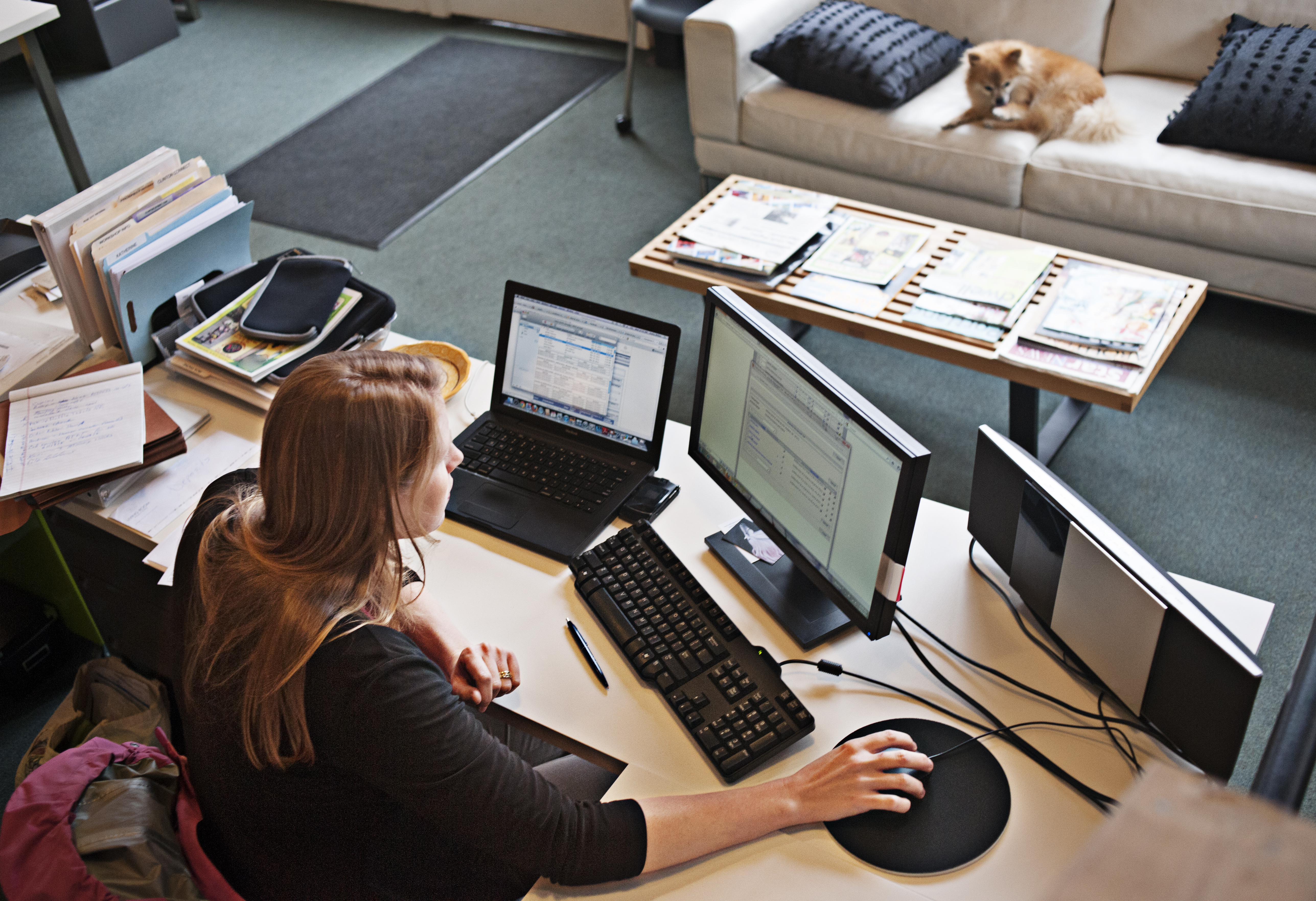Welcome to your new office!
Whether you’re a CEO, a psychologist, or a TV meteorologist, the COVID-19 pandemic has likely forced you to make the abrupt switch from the familiar comfort of a traditional office to the rewards and challenges of working from home.
Telecommuting—once seen as the goofy cousin in the business world—has grown up, become respectable, and is ready to save the day.
“I think this is a watershed moment for telework. It’s changing how people think about working outside the office, and its changing mindsets,’’ said Timothy Golden, a professor at Rensselaer Polytechnic Institute, who earned his Ph.D. in management from UConn in 2001. His expertise includes telecommuting, flexible work arrangements, and virtual leadership.
“For businesses that were reluctant to let employees work outside the office, they are now forced to change their beliefs about how work is conducted,’’ Golden continued. “This crisis will accelerate the use of telework on a more permanent basis, and allow these teleworkers the ability to still remain an integral part of the workplace.’’
Leading a Virtual Team Is Very Different
Leading a virtual team is vastly different from guiding a traditional one, said UConn Business Associate Dean Lucy Gilson, whose management research focuses on this topic.
“The big advantage with virtual teams is that you can put the best people on a team regardless of their location,’’ Gilson said. “But we’ve discovered they tend not to do as much planning as traditional teams. Virtual teams tend to get straight to work, which is great for simple tasks; but as projects become more complex, this lack of planning can hurt the performance of virtual teams.’’
That is likely due to challenges that arise when technology is the sole means of communication.
“Complex assignments create more questions, and when you can’t walk down the hallway to bounce ideas off a co-worker, people hold onto their questions and they then become issues,’’ she said. “Virtual teams need to pay extra attention to the importance of planning, brainstorming, and checking in. Leadership becomes even more important to make a virtual team thrive.’’
Another key to successful virtual work is to make sure that employees overcome the difficulty of distance and the limitations of technology, Golden said.
“One of the main challenges is avoiding isolation, both professionally and socially,’’ he said. “Employees and managers must mitigate that by taking time, for instance, to re-create the water cooler conversation via teleconferencing or, perhaps, by having a virtual lunch together. Ask your co-workers what’s happening in their lives.’’
“Those conversations help people feel connected and develop mutual trust and bonding. Those things are even more important when away from the office,’’ he said. “Many people have their social needs met, in part, at work. When people feel isolated, a whole host of negative things happen. Isolation has the potential to hurt relationships, decrease morale, and hurt productivity, so telecommuters need to be on the lookout for warning signs that isolation may be setting in.’’
Millennials May Have the Best Career Advantage
In times of crisis, there are always opportunities, and management professor John Mathieu, who has worked with NASA on team resilience, believes that millennials will excel during the pandemic.
“It’s a different world today than it was last week. We’re in uncharted territory,’’ Mathieu said. “This is an interesting time for millennials to shine. They’re less impacted by the disease, and have interacted virtually since they came of age. It’s an opportunity for them to mentor other generations.’’
Professor Travis Grosser, the academic director of the master’s degree program in Human Resources Management, also believes that technology has earned a better place at the grown-ups table.
“I think the coronavirus is going to cause certain people to become more proficient in technology-enabled collaboration applications. This is the case for me personally. I’m now learning about some powerful collaboration apps that I have previously ignored,’’ Grosser said.
“Many workers are going to end up having a broader and deeper knowledge of these technologies. This will no doubt impact how organizations operate today and for years to come,’’ he said.
Children Make Working From Home Difficult
Research suggests that telecommuting, under normal circumstances, generally has positive outcomes for employees, including increased job satisfaction and a greater sense of autonomy, Grosser said.
But these results are largely based on studies of people who have voluntarily opted to telecommute. Today, working adults are also contending with children who are home due to school closures, and the adults have to balance work and childcare.
“Telecommuting already runs the risk of blurring the boundaries between work and personal time. This will surely be the case for those having to care for dependents,’’ Grosser said.
Routine, Flexibility Garner Best Results
Although their workspace may now be relegated to a corner of the kitchen table, employees who keep a similar work routine will probably fare best, Gilson said.
“We know people need routines. If you normally work out and your gym is closed, go for a walk instead,’’ she said.
Equally important is being able to disconnect from work when your laptop taunts you from across the room. When your work is finished, turn it off, Gilson advises.
“People need to be kind to themselves on this new frontier,’’ she said. “Some things are deadline specific, but our work hours can be flexible with many assignments.’’
Kindness, Exercise May Emerge As Business Cornerstones
All four professors agreed that business will likely change in profound ways after this crisis.
“I’m sure this is going to change the workplace in some way. For example, many people are now getting introduced to things like food and grocery delivery services and telemedicine,’’ Grosser said. “An increased use of these services is likely to continue into the future because people will have gotten comfortable with them and recognize how convenient they can be.’’
Gilson suggests that working adults may get outside more and exhibit more kindness as a result of the pandemic.
“What I do hope is that this changes our culture so that people will go outside more. We’ve become very sedentary as a society. On the rail-trail close to where I live, this crisis has already led to more people biking and hiking, and that’s a good thing,’’ she said.
“People are helping each other and I hope that compassion will continue,’’ she said. “In tough times, people step up and that will be a positive that comes out of this too.’’
Mathieu agrees, and said consumers will take note of the companies and professionals who go the extra mile.
“I think we’ve seen some encouraging business responses, including free internet and restaurants serving hungry school children. Businesses are doing things they didn’t have to,’’ he said.
“It’s heartwarming to see people and organizations stepping up with services and financial support to help others through the crisis,’’ he said. “Healthcare professionals are doing incredible work and making a difference on the local and state level. People should long remember those who excelled in these moments.’’
Tips to Make Telecommuting Successful:
- Don’t work in pajamas! Getting dressed as you normally would will help to maintain some sense of regularity and will help you to be in “work mode” when you are supposed to be working.
- Keep your daily routines, make schedules for yourself and your children, and stick to them as much as possible.
- Reach out to others; don’t become isolated, professionally or socially. Informal video chats with colleagues can be a good way to help maintain connections and prevent a sense of isolation. Scheduling a 15 or 20 minute ‘coffee chat’ with a colleague or two can be a good proxy for the normal breaks you might take at work.
- Take short, individual breaks to help maintain work engagement, particularly if you are doing work that requires intense concentration. These breaks are even more beneficial in the afternoon than in the morning. The break should last 10-15 minutes and should involve activities that let you “turn off” from work for a short time. Consider taking a walk, playing with your kids, or having a healthy snack.
- If you can, work in a separate space, free from distractions, family members, and the temptation to do chores. Tell family members when it is OK to interrupt and when they need to leave you alone.
- Employees with young children might try to use flex time to do work when the kids are napping or after they go to bed.



